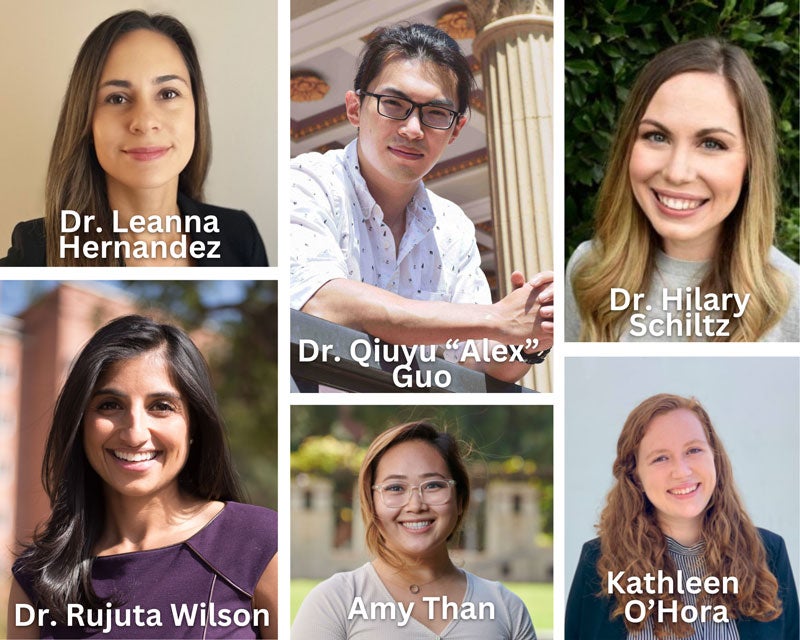CART Team Earns Numerous Awards to Examine ASD

The CART team has been hard-working this year as members from all levels of the center have earned numerous awards from national autism organizations across the country. Earlier in this newsletter, we have highlighted the momentous accomplishment earned by our CART director, Dr. Daniel Geschwind, who was recently awarded the National Academy of Medicine’s 2022 Rhoda and Bernard Sarnat International Prize in Mental Health. Here we highlight additional accomplishments by members of CART, each pushing the boundaries of autism science and impacting the field in tremendous ways.
Amy Than, graduate student under the mentorship of Dr. Shulamite Green and Dr. Mirella Depretto, was awarded the Brain and Behavioral Development during Adolescence (BBDA) Doctoral Training Fellowship for the 2022-2023 year. This T32 fellowship, funded by the National Institute of Child and Health Development, includes tuition, a stipend, and the opportunity to apply for travel and research funds. She will be studying how salience attribution and attention to social versus sensory information develops in adolescents with and without autism spectrum disorder (ASD).
This year, 3 of 5 recipients of the Autism Speaks research fellowships have been awarded to CART trainees. Kathleen O’Hora, graduate student under the mentorship of Dr. Carrie Bearden, was awarded a Pre-doctoral Fellowship looking at sleep and autism. Research suggests that higher connectivity between two brain regions responsible for processing sensory input is linked to sleep problems, sensory sensitivity and inattention in autistic people. This may be caused by altered sleep spindles, or patterns of brain waves that suppress information about external stimuli while sleeping. Sleep spindles can be identified by electroencephalography (EEG), a test that measures electrical activity in the brain. However, traditional sleep EEGs often lead to inconsistent and limited results. This study aims to identify other low-burden ways to observe sleep spindles and measure sensory challenges in ASD.
Qiuyu “Alex” Guo, post-doctoral scholar under the mentorship of Dr. Daniel Geschwind was awarded a Post-Doctoral Fellowship for his project examining autism genetics. Studies have shown that genetics play an important role in ASD, but the ways early brain development is affected by ASD-linked genetic variants is not well understood. This project will look at 1,062 genetic variants associated with ASD. The goal is to identify ASD-linked genetic variants, map out their target genes and understand their effects. The results of this study will allow for better assessment and interventions targeted to specific genetic variants.
Hilary Schiltz, post-doctoral scholar under the mentorship of Dr. Catherine Lord has also been awarded a Post-Doctoral Fellowship by Autism Speaks for her project that will examine loneliness and autism. Loneliness is common among autistic adults, often leading to a decline in mental health, physical health and quality of life outcomes. However, researchers and clinicians currently do not have an autism-specific tool to assess loneliness that captures the unique experiences of people with autism. This study hopes to develop a self-reported measure of loneliness for autistic adults that will be accessible for those with mild to moderate intellectual disability. The tool will be used in an ongoing 30-year study to help researchers better understand how major life transitions affect loneliness, social connection and well-being in autistic adults. Click here to read the press release from Autism Speaks.
Dr. Leanna Hernandez, post-doctoral scholar under the mentorship of Dr. Daniel Geschwind, received the Simons Foundation Autism Research Initiative (SFARI) fellowship for the 2022 Bridge to Independence Award. This award supports early-career scientists focused on autism research by facilitating their transition to research independence and by providing funding at the start of their faculty positions. Her project is titled: “Characterizing the impact of genetically regulated neural-immune signaling on brain development and symptom severity in autism.”
Altered neural-immune (NI) signaling is implicated in the pathophysiology of autism. However, there has been no systematic effort to examine how individual differences in NI gene expression affect brain development. Leanna Hernandez aims to identify common genetic variants associated with NI gene expression and characterize the impact of NI genetically regulated expression (GREx) on neurodevelopmental trajectories and liability for autism. She will integrate transcriptomic and genotype data from over 4,000 postmortem human brain samples across development to perform genome-wide association studies. To identify biomarkers of autism risk, she will also determine the impact of NI GREx on trajectories of structural brain development and psychiatric characteristics in over 10,000 youth with and without autism. The proposed research will generate a genome-wide resource for individual-level prediction of gene expression in the brain and characterize the impact of NI gene expression on neurodevelopmental heterogeneity in autism. Click here to read about this project.
Dr. Rujuta Wilson, assistant professor in Pediatrics and Psychiatry, Director of Research for the UCLA Trajan Center, and faculty member for CART has been awarded the Simons Foundation Autism Research Initiative (SFARI) Explorer Track grant in response to the 2022 Human Cognitive and Behavioral Science request for application. Her project is titled: “Quantitative motor phenotyping in nonsyndromic autism and chromatin modifying disorders.” Click here to read the press release SFARI.

